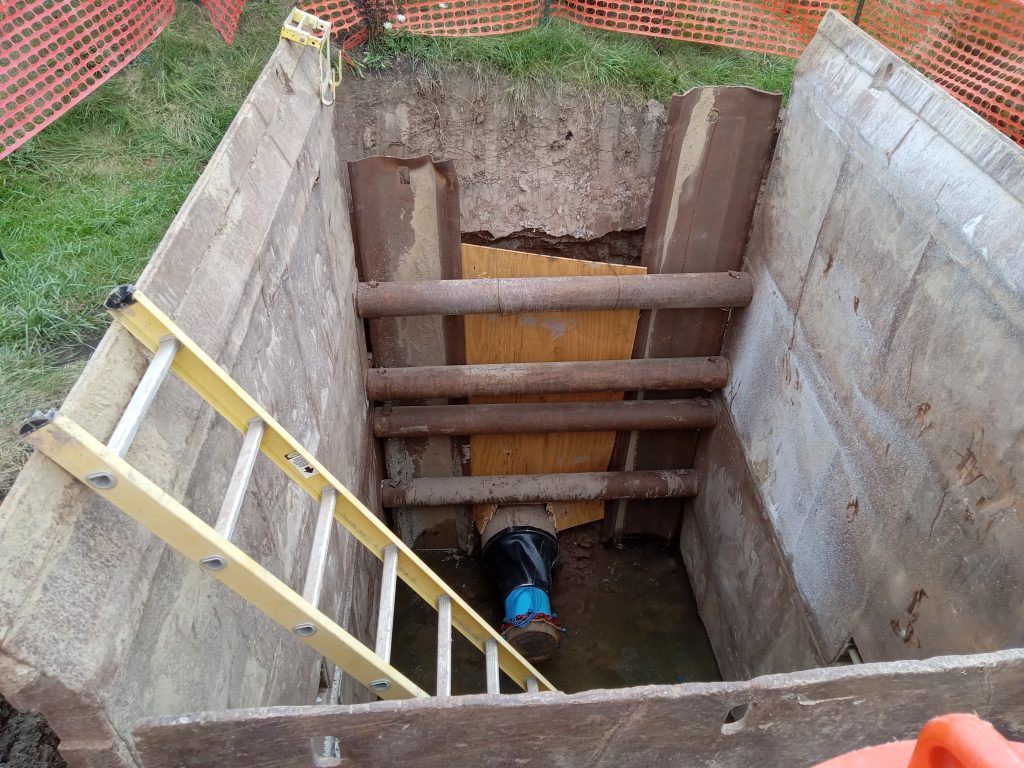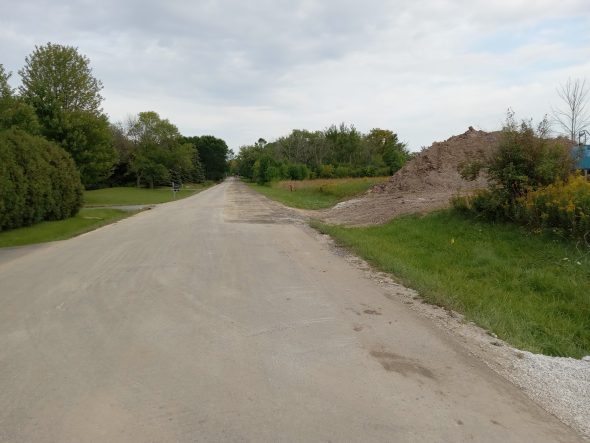Mequon Water Utility Expands to River Hills
Mequon now serves three other suburbs, including two in Milwaukee County.
After a decades-long court-mandated quest, the Waukesha Water Utility will begin supplying its mains in early October with 6 million gallons per day of Lake Michigan water, abandoning its radium-tainted wells. It joins a long list of area municipalities served by the City of Milwaukee system.
In a less heralded event, a Lake Michigan water transmission line beneath I-43 originating at Fairy Chasm Road in the Village of Bayside was connected Wednesday to a distribution line recently installed to the west in the Village of River Hills. It should become operational around the end of the month. This makes the village of 1,579 residents the fourth municipality to receive Lake Michigan water as customers of the Mequon Water Utility, which that city purchased in 2009 from We Energies. In the same year Mequon also bought the Bayside water utility. It also provides water to some subdivisions in the Village of Thiensville, which is completely surrounded by Mequon. At the end of 2022 the utility had 3,221 customers within the city limits, 1,183 in Bayside and 324 in Thiensville. Here is a map of the Mequon service area.
Why River Hills?
But even this would hardly justify the capital investment required to install water mains and hydrants.
University School of Milwaukee to the Rescue
Enter the University School of Milwaukee, which occupies a 125-acre campus between Fairy Chasm and County Line roads, immediately to the north of Eder Farm, now renamed “The Grove” (as are all Cornerstone developments). When in session, with its 1,142 students and 252 faculty and staff, the K-12 private academy nearly doubles the population of River Hills. On average it consumes 70,000 gallons per day of well water. And it doesn’t even have a pool! But that was enough volume to make the project feasible — and to provide fire hydrants along its route.
The move “to municipal water will be a huge win for those residents in the area who draw water from wells,” writes Chris Noyes, the President of River Hills in his July letter to residents. Those with homes along the route will also be able to shift to municipal water if desired.
Mequon’s Water Utility Has Unique History
Municipally owned water utilities are common in the State of Wisconsin. From Abbotsford to Yuba, there are some 574 of them regulated by the Public Service Commission. Most were created by their communities. Mequon is unique in that it bought its water utility from We Energies in 2009 following that company’s purchase of WICOR, the gas utility, which first brought Lake Michigan water to Mequon in 1998. A governmental unit taking over a private business is rare indeed. Some might call it Socialism.
Jim Voigt, who manages the Mequon Water Utility, has been with the organization since the gas company days. He tells Urban Milwaukee the remarkable confluence of events that led to the current situation:
Wisconsin Gas was a mature gas company in the late 1990’s. They had 1,000,000 customers in the state and they were only growing slowly with development, so the company was looking for ways to expand that were synergistic with their business model. They came up with three ideas. Water utility acquisition was one of them. They figured that they already had all the equipment and personnel trained to install and maintain buried pipelines delivering a product to a customer, so why not add a different product? Mequon was just the right opportunity.
Dr. Douglas Cherkauer (Hydrologist at UW Milwaukee) had been studying the aquifer for 20+ years and indicated to the City that the aquifer was being “mined” (more demand than supply) and would eventually run dry in approximately 2025. The worst impact in the aquifer was the “cone of depression” … the area bracketed by Port Washington Rd., Donges Bay Rd., Grasslyn Rd., and Fiesta Ln.
Mequon had been forced to take over the Developer built/run water trust called the Lemont Utility. The developer had gone bankrupt and the system had fallen into disrepair. It required significant investment and the DNR forced the City to step in. The City decided they didn’t want to be involved in the water business, so they went looking for someone interested in owning a water utility. In stepped Wisconsin Gas. Knowing the aquifer was under stress, the City of Mequon Common Council required Wisconsin Gas to negotiate a contract with Milwaukee Water Works to bring treated Lake Michigan water up to Mequon as the source of supply for the water utility. And the rest is history.
Water Sourced from North Shore Utility
Aquifer Recovery Seen
Unlike the North Shore Utility communities, most residents of Mequon, Thiensville, Bayside and River Hills will continue to rely on their wells. Last year the Mequon Water Utility supplied 388 million gallons of water that would have otherwise been drawn from the ground, over the decades halting, and possibly reversing, the prior trend of “mining” the aquifer.
It was not many years ago that well-digging rigs were a common sight in Mequon yards, as homeowners were obliged to deepen their wells if they wanted water. “You don’t see well drillers anymore,” Voigt tells me. “In fact, well diggers are telling me that they are now encountering artesian wells.” (Water flows to the well head under its own pressure.)
“Wells are artesian that never were before,” he adds.
If you think stories like this are important, become a member of Urban Milwaukee and help support real, independent journalism. Plus you get some cool added benefits.
Plenty of Horne
-
Villa Terrace Will Host 100 Events For 100th Anniversary, Charts Vision For Future
 Apr 6th, 2024 by Michael Horne
Apr 6th, 2024 by Michael Horne
-
Notables Attend City Birthday Party
 Jan 27th, 2024 by Michael Horne
Jan 27th, 2024 by Michael Horne
-
Will There Be a City Attorney Race?
 Nov 21st, 2023 by Michael Horne
Nov 21st, 2023 by Michael Horne
























